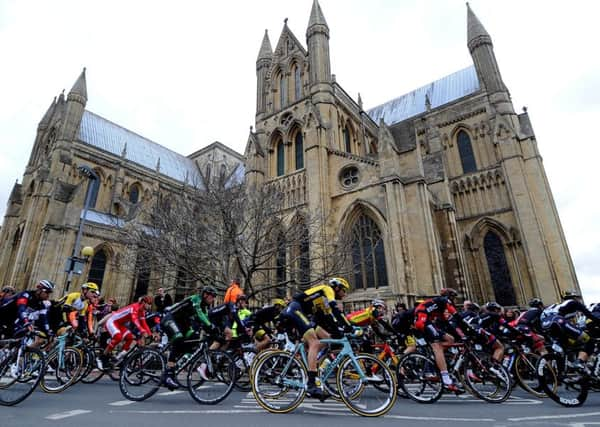Bishop of Selby: Faith in the countryside '“ why rural churches still matters in changing times


I was brought up in Uganda as my father was Professor of Physics at Makerere University in Kampala.
Every two years we returned to the UK for three to six months leave and the farm was a good place for the family to stay as it had plenty of space for energetic children to play and a house that could accommodate us.
Advertisement
Hide AdAdvertisement
Hide AdSo farming on the outskirts of a town on the Pennine slopes was part of my childhood story and rural matters in England were part of the conversation as town and farm existed in a dependent, but sometimes tense relationship.
Equally it was becoming clear that a small, mixed, family farm of 40 acres which had supported my grandparents and seven children together with a number of employees had no sustainable future.
Six of the children left the farm, one son to farm elsewhere, leaving a bachelor uncle just about scraping a living. It was clear to me even then that rural life was changing fast and that rural matters were complex and challenging.
Over the past three years since my appointment as Bishop of Selby, I have been learning more about contemporary rural matters by listening to those living in, working in and supporting the rural areas including the churches. Their message is simple. ‘We’re here, we’re still open, we’re here for the long term!’
Advertisement
Hide AdAdvertisement
Hide AdYet rural life feels increasingly fragile as Brexit raises questions about trade, labour and subsidy impacts for the agricultural sector, as relative population size, age and density puts increasing pressure on services, as house prices drive out the young and poor, as ignorance of rural matters among urban people seems to be growing and as broadband access continues to limit business penetration.
Having said this, it can be surprising news to many that the agri-food business to the UK economy contributes £108bn to the economy and 3.5 million jobs even though only 1.2 per cent of the population work directly in agriculture of whom 25 per cent live in poverty.
Yet, representing only 17.5 per cent of the population, rural residents can seem relatively powerless compared with their urban cousins. Furthermore, with 70 per cent of rural residents being incomers of varying sorts, rural life itself is a contested area of conflicting ideas about why and what are rural matters?
In the light of the above does the rural church matter? This is a question not simply for regular attenders or the churches as institutions but also to society at large. Two-thirds of Church of England parishes, 42 per cent of its clergy, 57 per cent of its Church Schools and 40 per cent of its weekly attendance are in rural areas. Together with other churches, this represents a major presence in rural life.
Advertisement
Hide AdAdvertisement
Hide AdIn the Diocese of York, we have 221 parishes with populations of less than 1,000. The average attendance rate in these parishes is 5.2 per cent. In our parishes of 10,000 or more the average attendance rate is 1.2 per cent.
Equally in most rural communities the church building is central and visible and whilst regular attendance may be modest, many residents belong with the church through events, relationships and affection for the building and churchyard. England is a landscape signed with the sacred and the message from the rural church is ‘we’re here, we’re still open, we’re here for the long run!’
This commitment brings many challenges with it. With changes in the demography of rural areas many inherited ways of belonging with and supporting the church in rural areas have become more fragile.
In addition retirement projections relative to recruitment of clergy, together with the costs of ministry and the challenges of maintaining buildings, two-thirds of which are listed, all press in.
Advertisement
Hide AdAdvertisement
Hide AdYet recent Yorkshire church initiatives such as the youth outreach ‘Bus Stop’ project (busstop.org.uk) led by Emily Finch and the re-introduction of chaplaincy in the Yorkshire Auction Marts by the Yorkshire Churches Rural Business Support to support the agricultural community alongside charities such as FCN, RABI and the Addington Fund demonstrate that for the church rural matters.
To this end, the Diocese of York will host a conference entitled ‘Resourcing Mission: Growing the Rural Church’ on April 28 at Norton College. Bishop James Jones KBE, who lives in rural North Yorkshire, will give a keynote address to be followed by workshops on a variety of themes such as celebrating local rural festivals, chaplaincy in rural communities, leadership teams in multi-church parishes and rural schools.
Dr Jill Hopkinson, the Church of England’s National Rural Officer, will give the concluding address. If you agree with me that rural matters and would like to be part of this event please contact your local church or visit www.dioceseofyork.org.uk/released4mission2018 and sign up.
The Rt Rev Dr John Thomson is the Bishop of Selby and the Archbishop of York’s Ambassador for Rural Life and Faith in the Diocese of York.